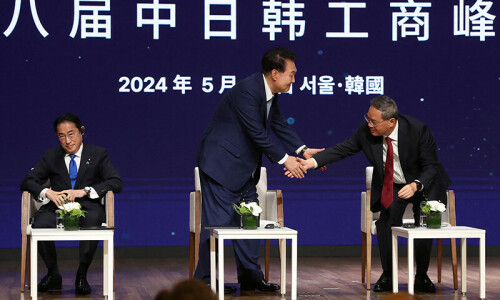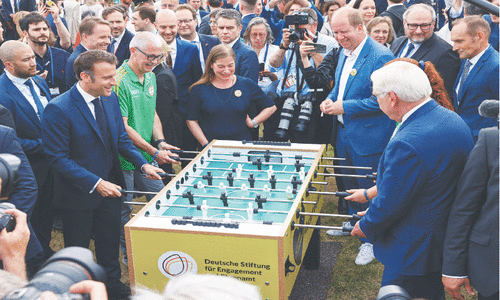PARIS: The anti-IS coalition will meet in Paris on Tuesday after a series of shock battlefield gains by the jihadists, with Iraq under pressure to step up its fight by being more inclusive of the Sunni minority.
The main focus of the meeting will be the crisis in Iraq, where the self-styled Islamic State seized the city of Ramadi two weeks ago in the biggest blow to the US-led coalition since it began bombarding jihadist positions in August.
US Secretary of State John Kerry will take part in the talks with Iraqi Prime Minister Haider al-Abadi and other diplomats “remotely” after breaking his leg in a cycling accident, the State Department said.
“We are going to discuss Iraq, how to get Daesh [IS] to retreat,” French Foreign Minister Laurent Fabius said last week, warning Baghdad over sectarian tensions which experts say are impeding the country’s ability to counter the jihadists.
“We engaged militarily but with a political condition: that the government be inclusive, that means bringing everyone together, Shias, Sunnis and Kurds.
“I am saying clearly that this needs to be better respected from now on,” Fabius said in separate comments to parliament.
French foreign ministry spokesman Romain Nadal said that while the talks would centre on Iraq, “taking into account the battlefield and the overlapping of the situation, Syria will also be discussed”.
According to a French diplomatic source, ministers from Turkey, Saudi Arabia, Qatar, and the United Arab Emirates are expected to be among 24 participants at the meeting.
Sunni-Shia suspicions
The US-led coalition of some 60 nations formed last year after the IS went on a rampage across Iraq and Syria, seizing key territory upon which it declared a caliphate.
With no one willing to send troops into battle, the campaign has relied on air strikes and efforts to arm and train Iraqi government troops and Sunni tribesmen.
However the jihadists’ capture of Ramadi, followed days later by the ancient city of Palmyra in Syria, has raised hard questions about the efficacy of the coalition’s current strategy.
It has also exposed the obstacle of ancient sectarian tensions between the Shia and Sunni sects of Islam which run deep in Iraq.
Magdalena Kirchner of the German think tank DGAP said efforts to include the Sunni politically “are not working at all” due to deeply ingrained suspicion between the two sides.
The coalition has pushed for Sunni tribal fighters to be trained to fight the largely Sunni IS fighters in their own areas, but Shia-ruled Baghdad is reticent to arm a population it fears may turn on it.
Washington itself has sent thousands of military advisers to train Sunni tribal fighters and help reform Iraq’s shambolic army.
Part of the hope was that better preparing the Sunnis to defend themselves would halt the spread of Shia militias loyal to Tehran.
But faced with the collapse of security forces during the fall of Ramadi, Baghdad reluctantly sent in the Iranian-backed Hashed al-Shaabi umbrella organisation for Shia militia and volunteers which helped government forces retake an area west of the city on Saturday.
Observers and politicians have warned that sectarianism in Iraq could be the death knell to efforts to combat IS.
“A way must be found to achieve what has so far proved most elusive: an end to the alienation of Sunni populations in Iraq and Syria, the most powerful engine of attraction for IS recruits,” Middle East expert John McLaughlin wrote in an analysis for the Brookings Institute on Saturday.
“This latter goal would require a combination of military pressure, persuasion and diplomacy of heroic scale. But the truth is that nothing else will work.”—AFP
Published in Dawn, June 1st, 2015
On a mobile phone? Get the Dawn Mobile App: Apple Store | Google Play














































Dear visitor, the comments section is undergoing an overhaul and will return soon.